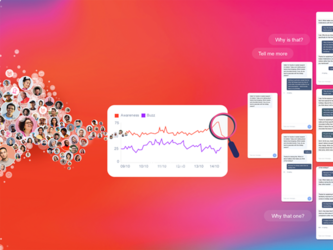Will the iPad kill the paper survey?
The iPad is an amazing tool. It’s lightweight, works on Wi-Fi and 3G and runs thousands of different apps. It’s reinvented personal computing. Most importantly for us, it’s a consumer tool with a consumer price tag. The App Store combined with the low cost will, I believe, turn the iPad into a massively efficient and cost-effective research tool for the field survey business.
Anyone who’s been in the market research business knows about the exponential rise of online research and the decline of field and telephone surveys. Although you could argue that the face-to-face and telephone survey business is not declining in the strict sense, it’s definitely not growing at nearly the same rate as online research.
The iPad changes the field survey business because it gives researchers direct access to the respondents in a way that was simply not possible with paper. Remember, the iPad is a connected device that consumers are very familiar with handling – or at least they are getting familiar at the rate of a million a month.
Field surveys are usually very expensive to run – you have to consider staff, location, data collection, data entry and report generation. Most companies turn to face-to-face surveys when they cannot find their target population easily online, or they are interested in tapping into the opinions at purchasing time. This idea of purchase intent at the mall is important, because research shows that the bulk of all purchasing decisions are made in store.
The iPad does not do anything for staff or location – you still have to hire folks to intercept people at the mall – but data collection, entry and reporting can now be done in real time. In the high-cost, low-margin business of field surveys this will be a game changer. Imagine going to your client and saying, “Not only can we deploy a survey in malls A, B and C simultaneously, we can enable complex branching, logic and quota controls in real-time and produce a live dashboard throughout the day as data is being collected.” It’s like going from paper to SPSS in 30 seconds.
The iPad may not be the first tablet device in the survey business, but earlier generations of handheld survey options were not cost-effective because they were targeting a very specific use case and business model. In the case of the iPad you can get the device for about $500 then pay about $30 to be connected to the 3G or Wi-Fi network. This sort of pricing is only possible if you’re selling lots of them. Fortunately, Apple is selling millions. The App Store then allows other companies to create apps that are specific for a target market – there are a couple of different tool providers that have built apps on top of the iPad platform to collect data and synchronise it with a central repository in real time.
The obvious question to ask here is, how come other tablets and PDAs have not changed the paper survey business? The iPad has three distinct advantages that other PDAs and handheld solutions do not have:
- Usability and familiarity – The ease with which you can start operating an iPad, thanks to Apple’s incessant focus on usability and the consumer, has not been achieved by any other vendor. If you give an iPad to a consumer they can start operating it within a few minutes. Even my two-and-a-half year old daughter can start apps, scroll pages, navigate back home and shut the device down.
- Battery life – No handheld computing device of similar weight or form has the battery life of an iPad.
- The App Store – The iPhone/iPad development platform has attracted over a million developers to the platform. There is no other comparable mobile development platform – more developers and companies are writing code for the platform than for netbooks or PDAs. This will allow for massive innovation in the software that can be use for collecting data.
Finally, you can charge more for this service. I’m a big proponent of value-based pricing, which is the only way to avoid the curse of commoditisation. The connected nature of this type of data-collection gives you the ability to communicate with your field staff in real-time on the target audience and population that you are trying to reach. That’s value worth paying for.
If you are thinking of conducting a field survey, it’s worth considering the iPad as a cutting edge, cost-effective and, more importantly, efficient way to deliver your research study. Who wouldn’t take real-time reports over two-week-old ones?
Vivek Bhaskaran is president and CEO of online survey software provider Survey Analytics.

We hope you enjoyed this article.
Research Live is published by MRS.
The Market Research Society (MRS) exists to promote and protect the research sector, showcasing how research delivers impact for businesses and government.
Members of MRS enjoy many benefits including tailoured policy guidance, discounts on training and conferences, and access to member-only content.
For example, there's an archive of winning case studies from over a decade of MRS Awards.
Find out more about the benefits of joining MRS here.













9 Comments
Anon
16 years ago
Using expensive consumer electronic devices should make the risk assessment for interviewers interesting reading. I suspect that in the short term at least, using ipads in this capacity may involve an insurance premium.
Like Reply Report
John Weisberg
16 years ago
It's great to finally see the level of excitement about mobile surveys that currently pervades the MR industry. When we started Techneos Systems 15 years ago we thought it would be the next big thing for research. We were wrong - it was and has been the Internet until very recently. In my view, focus on the internet is what has delayed the adoption of mobile computing based research techniques. The iPad, boosted by all the hype that accompanies Apple entering a new product space, simply launched at the perfect time to fire up an industry that is finally ready to adopt mobile solutions. There have been many mobile consumer devices we have used over the years, starting with Apple's Newton Messagepad in the early 1990s. Many were more affordable than the iPad, with some of the models from Palm listing for $99. The pen-based interface used by the Messagepad and Palm devices was familiar to all age groups - I was more impressed by senior citizens in the '90s, who had never used a computer, asking to complete a survey on the handheld themselves, than I am by kids today who grow up surrounded by computing devices and take to them easily. Battery life has always been critical, so any device that can't run for 8 hours plus on a single charge or with a battery change is poorly suited to interview work. Weight is another important criteria. We've found that 2 pounds (about 900 grams) is the limit for all day use. The iPad raises the bar in this regard, with a powerful processor, good battery life, and a beautiful screen in 1.6 pounds (730g) or less. Wireless is a wonderful capability, but still can't be relied on everywhere that a researcher might want to gather insight from the point of experience. I don't have a positive outlook about the iPad App Store's impact on research. While the wealth of available applications contributes to the iPad's popularity, I predict that given some mainstream media exposure of mobile survey successes, there will be a glut of generic survey applications pumped out by developers whose survey expertise consists of having completed some. Look to the history of internet surveys for an indication of where that could lead. So an answer to the article's title question, from someone who a decade and a half ago bet his savings and livelihood on mobile research becoming mainstream: the battle has been fought, the outcome is not in doubt, but when researchers finally acknowledge the general superiority of mobile computing devices over paper, credit the iPad with striking a very timely blow - nothing more.
Like Reply Report
Wiggert de Haan
16 years ago
I think the iPad will definitely make a difference on how fieldwork is done. The iPad attracks people, making it easy for interviewers to get respondents. Maybe this is only while the iPad is new to the majority. As the developer of iFieldWork, we have monitored a few fieldwork studies. We have also found out that the bright and big screen makes it really easy to show pictures to the respondents. The GPS function is a really nice extra to be able to differentiate the results by location. Another insight we gathered is that depending on a internet connection is not always handy. We have tried different setups (wifi, 3g trough mifi, 3g), and the latest firmware solves a lot of problems, but eventually, you will want an offline application. At the moment we are developing an app that will have the survey logic local instead of on the web. It’s able to synchronize the data whenever a internet connection is available, having the opportunity to monitor the progress of the study. It will work on a public API, enabling other parties to load their survey data into the client. We are still looking for developers interested in implementing this API. They are welcome to sign up for the beta program. (@wiggert) Overall there are still lots of opportunities to explore with the iPad. Also on different areas, like dedicated application for access panels.
Like Reply Report
Anon
16 years ago
Can you tell me some apps that can be used on the ipad for field research/ quick polls/ on-site surveys? Thank you!!
Like Reply Report
Sam Samanta
16 years ago
Hi Vivek, Unlike paper survey, using electronic survey one can monitor the meta network of "Value"/interest in real-time, to commence adaptive changes instead of waiting period during which the realities on ground can change enough to potentially make paper survey worthless. ********************************************************************** Send me an email address to which I can send an Excel file in which I analyzed the Votes vs. Rank on the on-line forum for the White House Community College Summit. I used the Inverse Power Law fractal dimension of that data (as of 2010.09.30) to scale my interest for Innovation Priorities to National Priorities. *Prahanta Samanta (Sam)* http://communitycollege.ideascale.com/a/dtd/Innovations--Personal--$k--=--National--$M-/80350-10450
Like Reply Report
teddy
15 years ago
What you say kill? It may reduce,but kill,forget that.
Like Reply Report
Liliana
14 years ago
Hi. I am a researcher in a hospital and I am looking to convert over from paper surveys to the iPad. Any ideas on any companies that develop software on the iPad?
Like Reply Report
Machel Black
14 years ago
I think it will surely change the landscape of how surveys are conducted, I use an ipad with an app called surveyMe! and it works great for me.
Like Reply Report
Audun
13 years ago
"The iPad does not do anything for staff or location" I can't agree with this statement in the article. We are actually employing iPads to hospitals and medical practices specifically in order to reduce the paper/pencil management done by front staff . The iPad survey app allows for less disruption of the healthcare workflow which is under considerable stress these days. For the healthcare industry consider www.caretotell.com (HIPAA compliant).
Like Reply Report